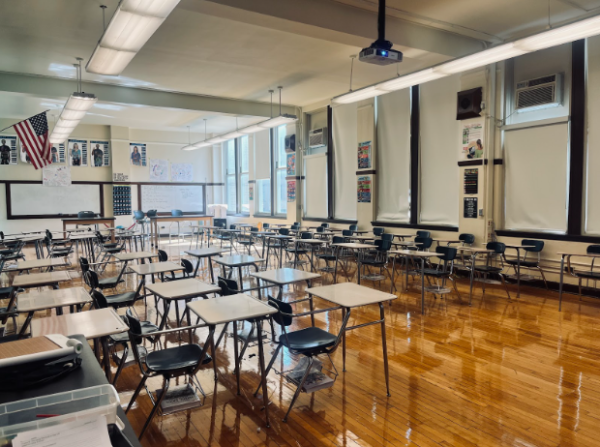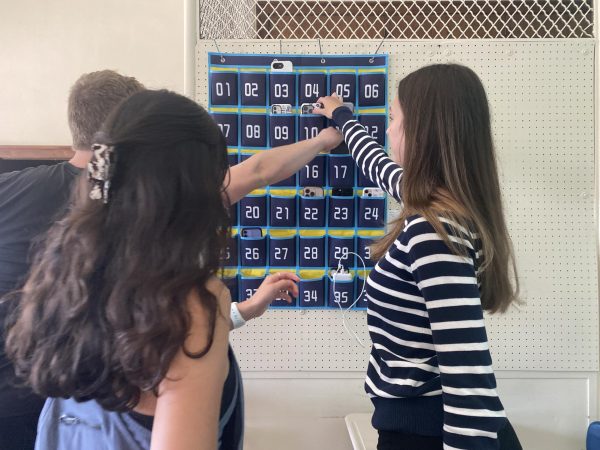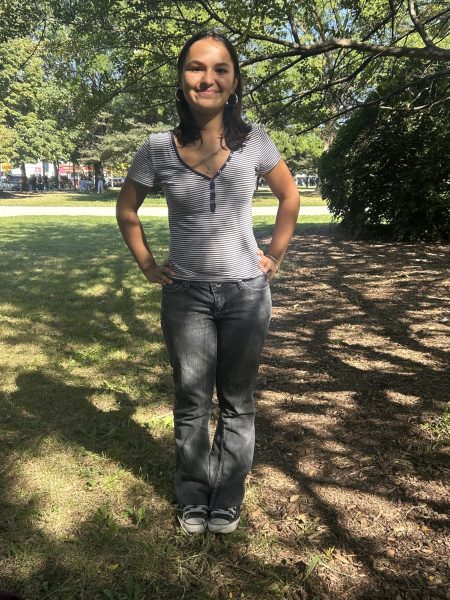Class Discussion brings students long-life lessons
Max Rains, Div. 067, raises his hand to contribute to Ms. Lawrence’s class discussion on The Great Gatsby.
Every day, Ms. Lawrence kicks off her English classes with a bellringer. Sometimes it’s a quote, sometimes it’s a question and every Thursday, it’s usually about college. One thing is for sure – it always leads to a class-wide discussion.
Usually common in English classes, discussions can range from a variety of topics such as the context of a novel, or even current events and issues, Nathaniel Segura, Div. 963, said.
Class discussions are an important factor of learning because students can learn other facts and opinions from fellow peers, Vuk Djuric, Div. 974, said.
Djuric said that class discussions or debates happen on a daily basis in all his classes, including Math, U.S. History, AP European History, and English.
“I think debates should be the key aspect of classroom life because anything can really be debated if you think about it,” Djuric said.
In English classes, students can often discuss the meaning of the author’s text, said Djuric.
Teachers can also encourage students to connect discussions about the context of the literature to students’ personal experiences.
Lawrence often encourages students to reflect on what occurred during the authors time, compared to how similar it is in today’s society.
“It’s a way for them to express themselves in a way that relates the to literature, but still is personal,” Lawrence said.
Ms. Sears, who teaches AP English Literature, also uses discussion as a daily tool in her class being that AP Lit is a discussion-based class.
Sears primarily focuses discussion on the context of literature itself.
“The idea is that you are reading something at home and then talking about its themes, ideas, characters, etc., during class,” Sears said.
Student interaction also plays a huge role in Sears’ classes, allowing students to share their thoughts with a partner before discussing them as a whole class.
“I always pose a question to the class, like I will say ‘Turn to your neighbor’ or maybe they will have a minute or so to jot something down on a notebook,” Sears said. “I feel like that allows the students to get their idea formulated.”
Discussions are not always about a book; some teachers cultivate discussions based on current events such as social and political issues.
Ms. Laroche, AP Language & Composition and British Literature teacher, dedicates every third Friday of the month to a “Discussion Day” where a new group of students get to pick a topic for discussion, along with an article for the class to review in preparation.
Laroche realized that there needed to be a specific time for discussions because students were often getting off-topic from English content, instead, talking about current events.
“So I instituted this, I did it [Current event discussions] once a month. Once a month, we had time set aside to talk about these issues because they are important but we also need to do this content.” Laroche said.
Segura said that throughout his whole high school career, all his English classes also make it a priority to talk about current events right away, even if they may carry some controversy.
“Whenever a major current event happens, such as when Trump got elected, or when recent shootings happened, such as Sandy Hook or Parkland, [teachers] would stop whatever they are doing no matter how important they were,” Segura said.
Class discussions about these controversial topics allow students to share their own personal opinion, which could lead to differing views within a class conversation.
In-Class conversations about current issues are necessary in and out of the classroom, said Djuric.
“I think it’s something that’s key for just society as a whole to function,” Djuric said. “It opens people’s eyes to what everyone else is thinking on a certain subject and it makes them more open to other opinions when they hear the ideology behind certain ideas.”
It is important to always listen to another person’s perspective, even if the opinion is completely different than your own, according to Segura.
“Contemplate it,” Segura said. “Understand it. And then be able to verbalize what you think is right, then agree or disagree with it.”
Hearing from a variety of students is important too, according to Lawrence, because everyone has a different perspective coming from their own experiences.
“I encourage everyone in my class to talk,” Lawrence said, “Because I always tell them they have something special to say, and if they don’t say it, we will never get it.”
In-class discussions can teach students things outside of the classroom too, according to Laroche, leaving them with lessons to have for the future.
“I think being able to listen to people, being able to disagree respectfully are things that you need to have to be a person in the world,” Laroche said.
Change in the world starts with talking about it with your peers, regardless of the difference in opinion, Segura said.
“With the society we live in now, we need to talk about these things,” Segura said. “We are the future of America, we are the future for the rest of the world, and if we want to see progress, we need to make the change happen.”
Your donations directly fund the Lane Tech student journalism program—covering essential costs like website hosting and technology not supported by our school or district. Your generosity empowers our student reporters to investigate, write, and publish impactful stories that matter to our school community.
This website is more than a publishing platform—it's an archive, a research tool, and a source of truth. Every dollar helps us preserve and grow this resource so future students can learn from and build on the work being done today.
Thank you for supporting the next generation of journalists at Lane Tech College Prep!

Anahi is currently a senior at Lane. She has been part of The Warrior since her junior year and is now Managing Editor. She’s been part of Varsity Cheerleading...




